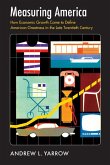Americans now depend more heavily upon credit than any other society on Earth, or any other time in history. Borrowing has become a way of life for millions of families, and it is hard to imagine a time when charge accounts did not exist. Nonetheless, it would be a mistake to assume that, because a wallet filled with plastic instead of cash is a relatively new phenomenon, Americans have not been borrowers and lenders since the colonization of the New World. Author Peter J. Coleman proves otherwise. In one Form or another -- notes of hand, book credit, commercial paper, mortgages, land contracts -- settlers borrowed to pay their passage from Europe, to buy and clear land, to build and operate mills, to purchase slaves, and to gamble and drink. Debtors' prison awaited those who could not pay their debts, and a pauper's grave received the unfortunate who lacked the private means to feed and clothe himself in prison. While the debtors' prisons described in this book no longer exist, the author maintains that our credit-oriented society has yet to devise cheap, efficient, equitable, and humane methods of enforcing contracts for debt.
Hinweis: Dieser Artikel kann nur an eine deutsche Lieferadresse ausgeliefert werden.
Hinweis: Dieser Artikel kann nur an eine deutsche Lieferadresse ausgeliefert werden.







